Can you feel the beat? Rhythm games had a big boom in the early to mid-2000s with the likes of Guitar Hero and Rock Band titles seeing massive success. Unfortunately due to a combination of expensive required instruments and a market flooded with nearly identical titles, the genre quietly slipped back into a more niche spot in the industry. That doesn’t mean rhythm games have gone away, though. In fact, music games for PC have been pushing the very definition of what a “rhythm game” is.
As with almost every genre you love, being a PC gamer is both a blessing and a curse. On one hand, you have access to a near-limitless number of titles that fit into your genre of choice. On the other, there’s an overwhelming number of games that aren’t worth your time that can distract you from the truly special ones. No one wants a bad song stuck in their head, but a bad rhythm game is as bad as a terrible song plus a bad game all wrapped into one. The balance is tough, but these best rhythm games on PC offer top soundtracks, unique gameplay, and satisfying experiences for all of your senses.
See more
Beat Saber
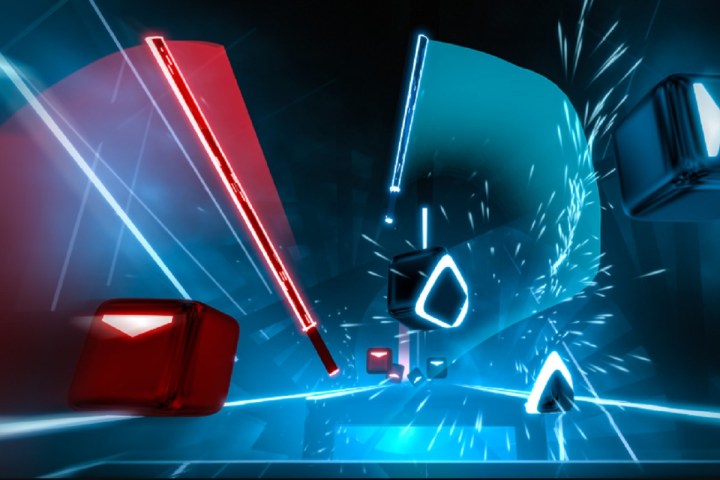
We’re starting out with one that has a bit of a barrier to entry, but if you have a VR headset and love rhythm games, there’s no excuse not to get your hands on Beat Saber. Not only is this game considered one of the best rhythm games in VR, but it might just be the most popular VR game full stop. The format just fits so perfectly into what VR does best that it’s almost crazy to think no one did it sooner. Your controllers become two lightsabers essentially as blocks fly towards you in time with the song. You need to then swing in the correct direction with the right colored saber to slice through the block. Sounds simple, right?
Beat Saber is easy enough that anyone, regardless of gaming history, can intuitively grasp in a short amount of time. At the same time, as a rhythm game, the difficulty is completely under your control. You can start off with slow-paced, easy songs, or work your way up to songs where blocks are flying at you so fast and so consistently that you will almost be doing an intricate dance. The game itself comes with a great set of songs already, but what makes Beat Saber so perfect on PC is the fact that you can import any song you want and play it. The only thing that can keep you from playing forever is your own stamina.
Thumper
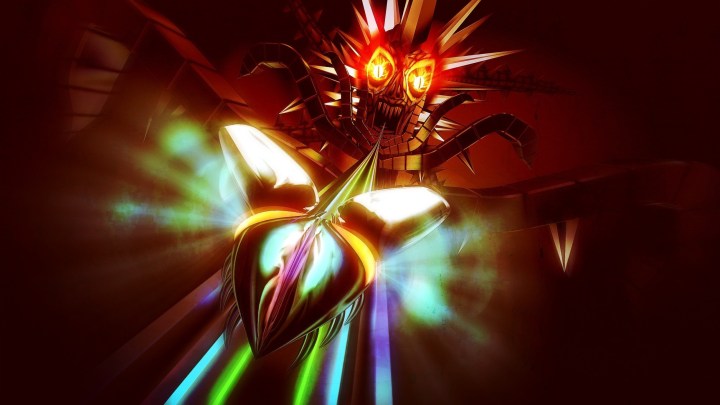
Have you ever thought a rhythm game could also be a horror title? If not, give Thumper a try. Sure, it won’t scare you like Amnesia or Resident Evil will, but there’s no denying that Thumper clearly has an atmosphere that is unsettling at the very least. This is another game that works best in VR but can be played traditionally if you want. There are no motion controls to tire you out, but actually feeling like you’re in dark, industrial, yet oddly organic tracks is a somewhat exhausting experience regardless. It is also one of the rare rhythm games to have “boss battles.”
You control a little metallic-looking beetle on a single track hurdling through giant environments. There are only about three or four things you need to pay attention to and react to, on the beat as you might expect, so the difficulty ramps up in terms of how quickly the game asks you to react to them. The soundtrack is heavy, often almost industrial, and toes the line of being uncomfortable in some places, but never crosses it. There are only 9 total stages, but mastering them and earning the top rank can keep you occupied for way longer. VR or not, Thumper is a great change of pace from your normal rhythm adventure.
Crypt of the Necrodancer

Another genre blend that sounds like it would never work on paper, this time one brave studio decided to try mixing the popular rogue-like genre with rhythm game mechanics. The result was the hit Crypt of the Necrodancer, and later a follow-up spin-off of sorts using the Zelda license called Cadence of Hyrule. The original game, which is where you should start, puts you in the role of one of many unlockable characters diving into procedurally generated dungeons, as you would expect from a rogue-like. Where the rhythm aspect comes in is how each move you make, or attack you do, needs to be timed to the level’s beat, but so do the enemy’s. Since you know when they can move and attack, you always have an opportunity to react if you’re quick enough.
Crypt of the Necrodancer is more of a freeform rhythm game in that way. You’re not hitting specific notes in time, but rather timing moves of your choice to the beat. As you hit deeper levels, the BPM goes up and your timing, thus reaction speeds, need to go up. The spin-off Cadence of Hyrule takes that same concept but puts it into the nostalgic lens of a classic Zelda game. Of course, it has that iconic soundtrack to bop around and take out old familiar foes with too, but unfortunately, this Nintendo-published game will probably never see a release off their consoles. Still, Crypt of the Necrodancer is the main experience, offering almost endless amounts of replayability like the best rouge-likes.
BPM: Bullets Per Minute
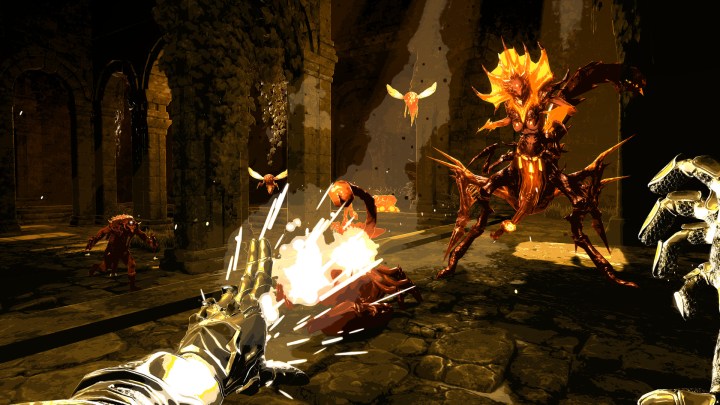
The next experimental game that we loved every minute of is the FPS rhythm game BPM: Bullets Per Minute. Again, this bucks the trend of just asking you to recognize a pattern and hit a series of buttons with the right timing. Not that we dislike that formula, and we’ll feature plenty of those classic rhythm games on this list, but we just had to highlight these games that tried to push the boundaries a bit, and BPM: Bullets Per Minute is one both FPS and rhythm game fans need to check out. In a lot of ways this game shares elements with the previous entry on our list, such as being a rogue-like, but the feel is all its own.
You play as one of 10 playable characters traveling through generated realms attempting to beat all seven bosses in one clean run to win. As you go, shooting your way through the different enemies, an appropriately heavy metal soundtrack, somewhat reminiscent of the two recent Doom games, will be your metronome. If you move, shoot, and reload in time, your score and damage multiplier will increase. If you try shooting off the beat, your gun will misfire leaving you vulnerable. You’ll pick up tons of satisfying weapons, new abilities, and consumables to help you through, but none will compensate for poor timing. If you master the main game, there are always the challenge modes waiting to push you to the brink of human reaction speeds.
Friday Night Funkin’
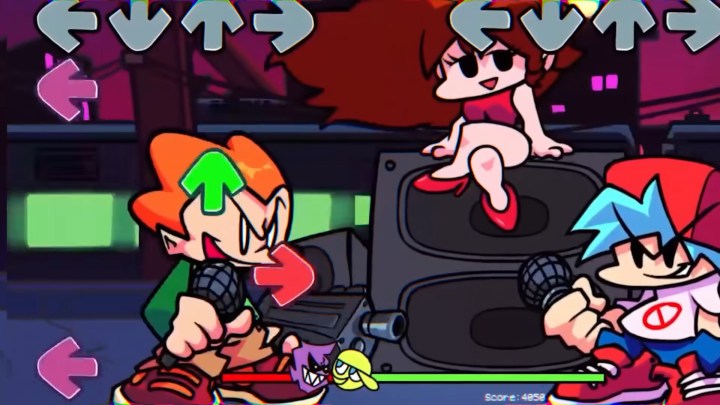
One look at this rhythm game and anyone who was around during the heyday of Flash, specifically the Newgrounds style, will instantly be smacked in the face with nostalgia … in a good way. The look is by no means a coincidence, or a simple attempt to prey on your memories since Friday Night Funkin’ was created by former Newgrounds users as part of a game jam in 2020. After seeing the potential in it, Friday Night Funkin’ was expanded into an open-source donationware game, and a full release, set to be titled Friday Night Funkin’: The Full Ass Game, was already backed on Kickstarter for an early 2022 release.
Friday Night Funkin’ is very similar to the most popular and longstanding rhythm games such as Dance Dance Revolution. Each stage is broken up into weeks that have three songs each as they duel against a different opponent. Just like DDR, you will hit your arrow keys in time with them as they scroll across the screen. You can change up the difficulty from easy, normal, and hard from week to week. The story is as basic as they come but serves the purpose of establishing a reason to duel different characters. You play as Boyfriend who needs to beat the various bosses to keep dating his crush Girlfriend. Every week has a new style of music, but all are catchy and a blast to play through. Since it is open-source, you can also enjoy tons of user-created content for even more songs to try out in the free play mode too.
Lumines: Remastered
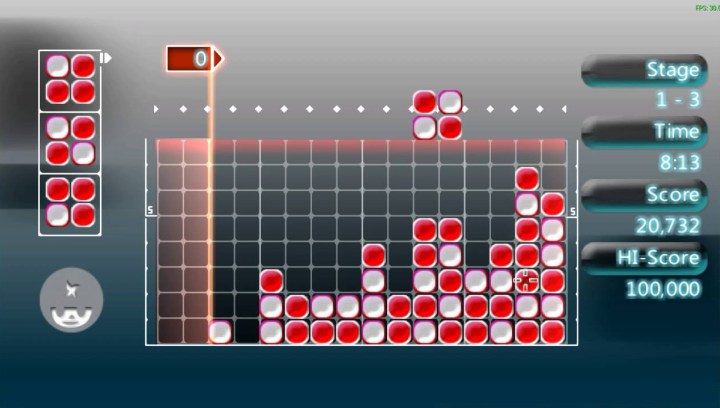
We’ve covered a ton of odd and unique genres that melded with the rhythm genre, but one that actually makes perfect sense is a puzzle game. There’s a lot of similarities between timing your key presses to a beat and something like Tetris, which is what you would ultimately get with Lumines: Remastered. The original version came out way back as a launch title on the PSP in 2004 but was such a cult hit that it finally got a remaster on all major platforms, including the PC. Designed by the legendary Tetsuya Mizuguchi with music in part by Takayuki Nakamura from Sega, it earned very high review scores and is considered one of the best launch title games of all time. Many compared it, in a positive way, to how addictive Tetris was, and Lumines: Remastered certainly hasn’t lost that addictive edge.
The game is all about dropping and matching tiles on a 16 by 10 grid. You get a 2 by 2 block to move, rotate, and drop, just like Tetris, to try and connect the same colored squares into a 2 by 2 block or bigger. A time line will be constantly running from left to right across the screen, and when it hits any groups of that size, it removes those blocks and gives points. You can earn more points by having the line erase as many blocks as possible in a single sweep across the screen. It might sound a little complex, or maybe too simple, but you really have to play it to understand just how perfect this game’s take on rhythm and puzzles works. Lumines: Remastered includes everything from that original version, with graphical and performance boosts, plus more modes that were only added in sequels, including a somewhat bizarre Trance Vibration mode you just need to experience for yourself.
Sayonara Wild Hearts
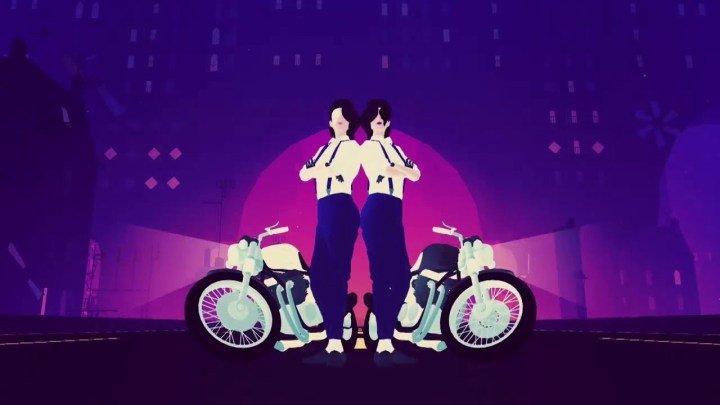
The worst part about rhythm games is that they often have all these incredible things going on in the backgrounds that you, the player, can’t even see because you’re focusing on hitting the next note in the track. Almost every game in the genre struggles with wanting to have these intricate and well produced music videos going on while you’re playing, but also not wanting to distract you from actually performing well in the song. Not until Sayonara Wild Hearts has a game found a way to perfectly meld these two elements together. And that’s really the saving grace for this particular game because it just looks so good that you won’t want to miss a single thing happening on screen.
Sayonara Wild Hearts has 23 levels that all flow together with the same design idea of a single album. You play as a woman who is progressing down a track in various ways, from riding a motorcycle to straight up flying, while trying to collect hearts and press the right keys to the music. There’s more to it than that, and different levels introduce their own bespoke mechanics, but that’s the main idea. Moving to follow trails of hearts keeps your eyes on the character, allowing you to really soak in the beautiful visuals while the music helps guide your actions, and when the action picks up, such as in the boss fights, the button prompts are all placed dynamically in the action rather than in a static spot at the top or bottom of the screen like a normal rhythm game. You’ll be fully engrossed in this neon drenched, pop and jazz infused experience like few other games in the genre.
Rocksmith 2014 Remastered
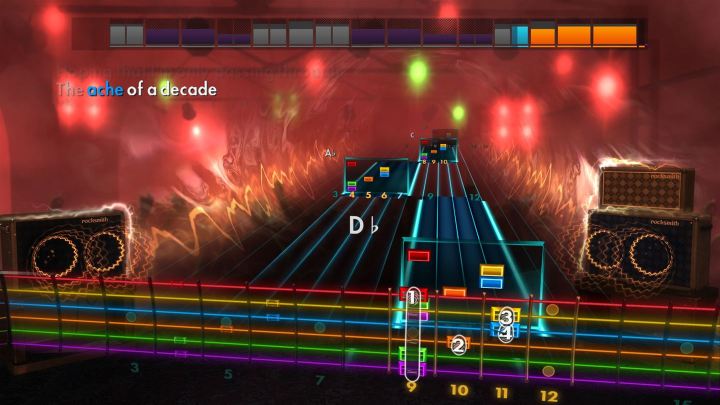
You might be able to play every song on the hardest difficulty in any of the Guitar Hero or Rockband games, but that won’t really help you play any of those songs on a real instrument. Rocksmith 2014 Remastered was built to turn the addictive qualities, easily understood mechanics, and fun of playing a rhythm game into a learning tool to actually help teach you how to play guitar or bass. The game ditches the clunky and awkward plastic guitars that could only be used for those games and instead has you plug in your real electric guitar or bass into your system with a USB adapter so you can learn to play on the real instrument. This is quite possibly the best implementation of gamifying learning the industry has produced yet.
Rocksmith 2014 Remastered adds a ton of new features and tools to the already impressive original release. The standard game comes with 66 songs to play and learn, but there have been over 1,000 more added as DLC content, and the PC version can even import custom songs built by the community. Essentially, the track list is endless. There are nearly 100 dedicated lessons, multiple difficulty levels, a customizable learning curve, stat tracking, and tons of other tools to help you go from plucking your first cord to ripping through your favorite rock songs. Just to be clear, while this is a game, it is first and foremost a learning tool. It’s fun, and looks like a Guitar Hero style game, but you will be learning real skills here.
Rez Infinite

This might be the most surprising game to have gotten a revival due to just how niche it was upon release, but the updated Rez Infinite is almost more of an experience than a rhythm game. The entire aesthetic of flying through these wire frame-looking zones that warp, shimmer, and transform in odd ways as the music plays is so surreal it almost feels like a dream, especially when played in the VR version this release comes with. You never know what’s coming up in Rez Infinite, but it somehow is all perfectly readable and relaxing. Even though it isn’t a “traditional” rhythm game, you will easily find yourself entering a similar trance state while playing.
Rez Infinite is somewhat like an on-rails shooter in how you play. As you fly through the levels, enemies will appear that you need to target and lock on to, up to a maximum of eight, before firing off tracking bullets that destroy or damage whatever you target. Think Star Fox’s lock on missile, but you can paint multiple targets before launching multiple missiles. Stages have multiple phases that end in a spectacular boss encounter where target management and priority is tested more than just reaction speed and pattern recognition. Everything in this game contributes to the music, too. The better you get at Rez Infinite, the better the entire experience becomes.
Fuser

Somehow we’ve reached the end of this list without name dropping the most influential and dedicated rhythm game developer of all time, Harmonix. This studio is responsible for early rhythm game classics like Frequency and Amplitude, before creating the megahit Guitar Hero franchise, and later the successor series Rock Band. Fuser is the latest project from this musically focused studio, and is another experiment in redefining what the genre can be. This game is unlike basically any other game on this list, and in many ways isn’t exactly a “game” in the normal sense, but closer to a music tool withing gaming elements. It isn’t a teaching tool like Rocksmith, but more like a canvas where you’re free to experiment and create your own new musical compositions using existing pieces the game gives you.
You’re a DJ in Fuser and need to take different samples from a huge swath of existing songs and fuse them together into a brand new beat. You will mix songs by moving different color-coded records, each color representing a different instrument, and adding them to the track. The game part comes in how you earn a higher score by adding in new tracks on beat and responding to the crowds’ request for samples to be added from specific songs or genres. You can also play co-op to collaborate on a mashup, or in a competitive mix battle. Somehow, mixing elements from songs as different as Party Rock Anthem, Rock the Casbah, Don’t Fear The Reaper, and Old Town Road always at least mesh well, but it is up to you to make them sound great. And, however Harmonix managed to manipulate tempo and balance, there’s almost always a way.



